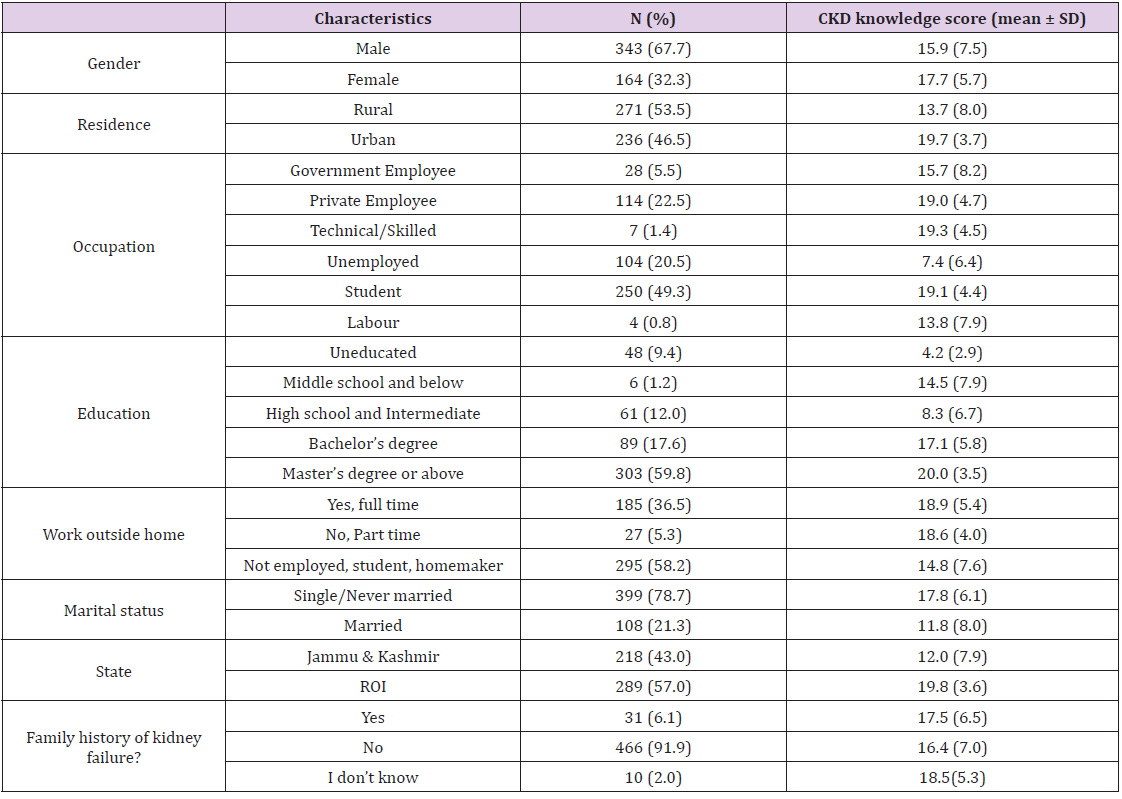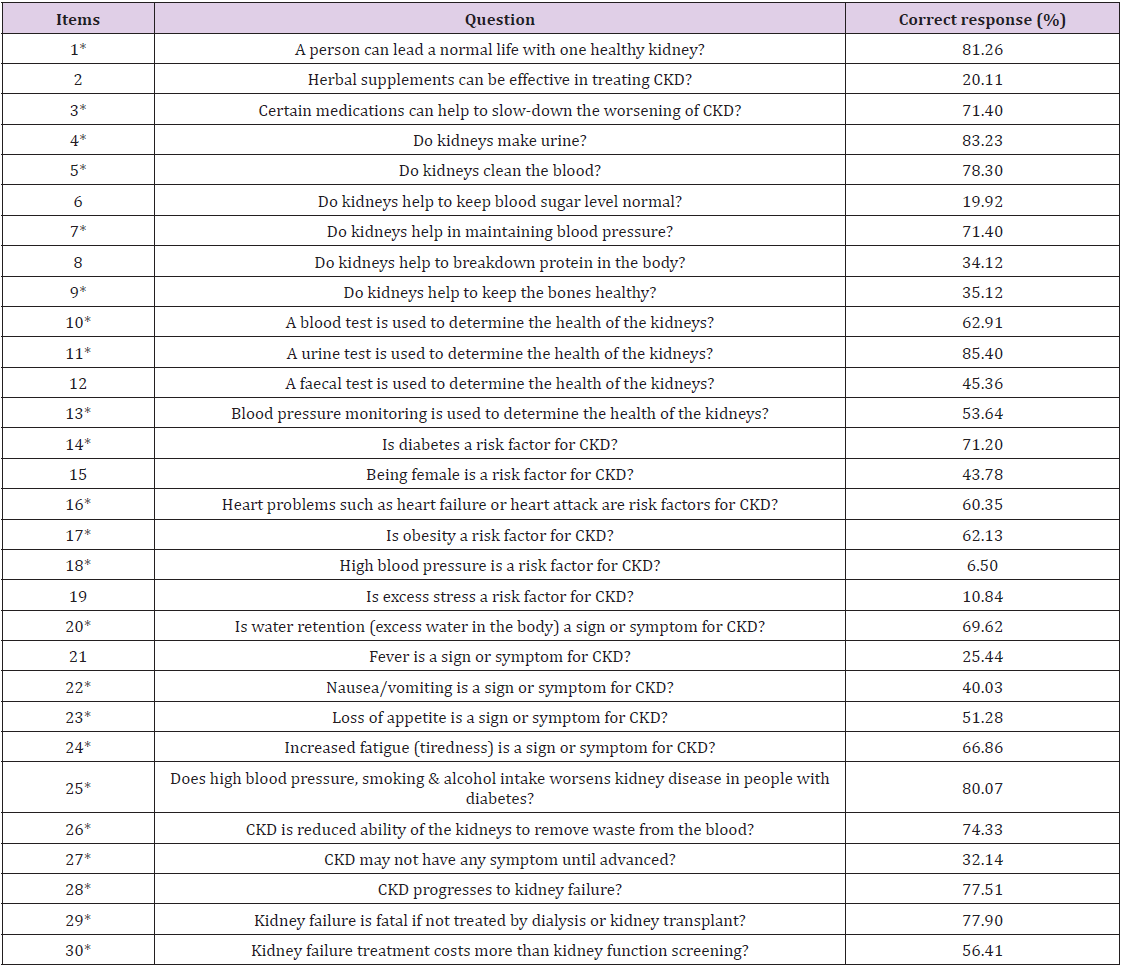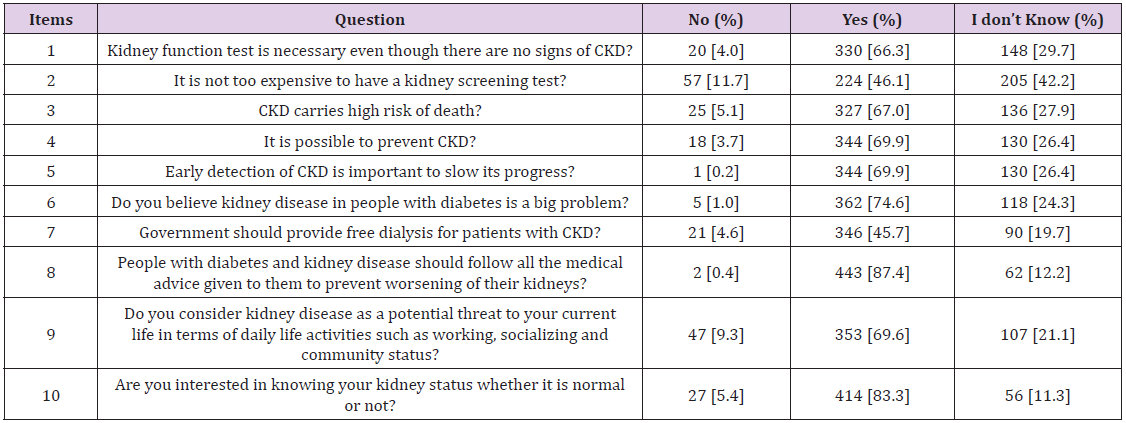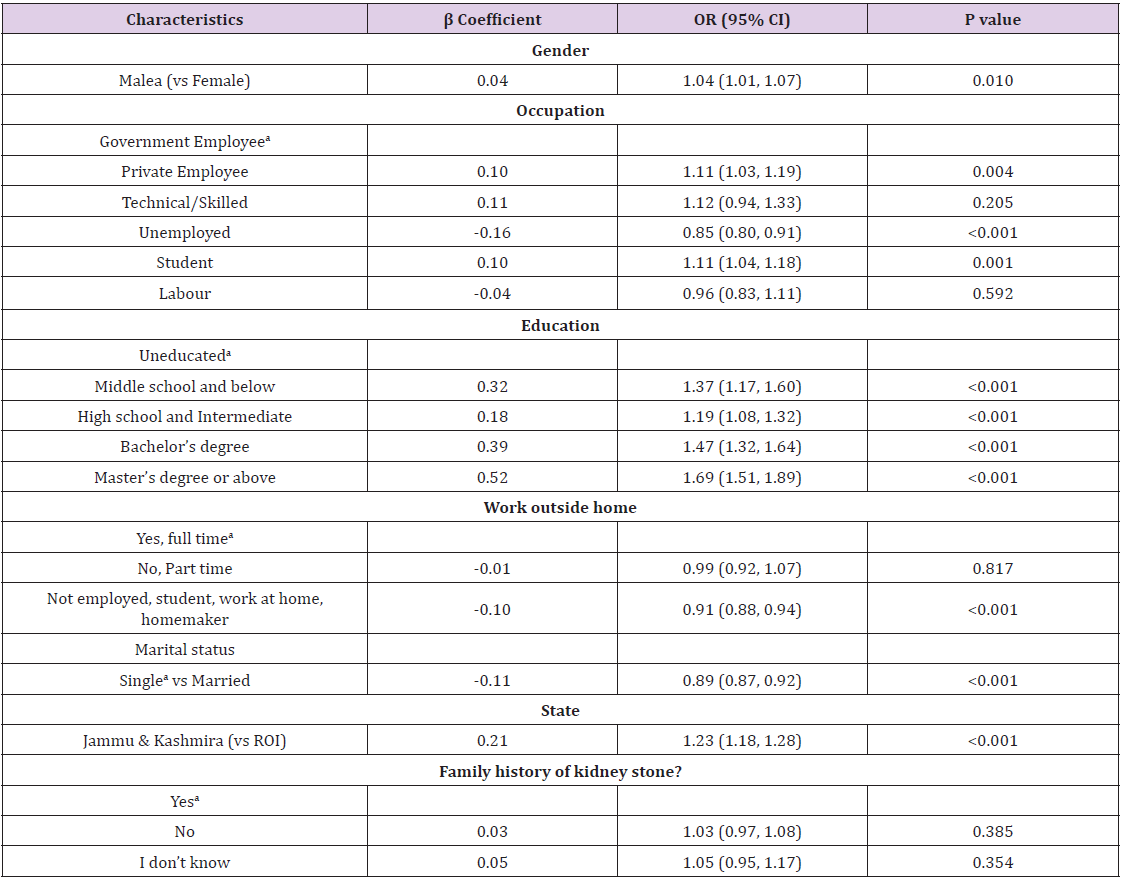Assessment of Public Knowledge and Attitude towards Chronic Kidney Disease by Using a Validated Questionnaire: An Observational Study
Introduction
According to Kidney Disease: Improving Global Outcomes, chronic kidney disease is defined as any abnormalities of kidney structure or function, present for greater than 3 months, with implications for health, and requires one of two criteria documented or inferred for greater than 3 months: either GFR <60 ml/min/1.73 m2 or albuminuria level (AER ≥30 mg/24 hours; ACR ≥30 mg/g [≥3 mg/mmol]) which is considered as a marker of kidney damage. Chronic kidney disease, being a condition that affects a large number of populations, the prevalence consistently ranges from 11% to 13% with majority in stage 3 (eGFR 30–59): 7.6% (95% CI; 6·4–8·9). The estimated worldwide gender specific prevalence of CKD is 10.4% in men (95% CI; 9.3 to 11.9) and 11.8% in women (95% CI; 11.2 to 12.6). It is Implicit, that future research must focus on evaluating such strategies that can help to prevent the progression of chronic kidney disease and improve cardiovascular disease outcomes [1]. Chronic kidney disease increases the risk of cardiovascular morbidity and premature mortality among the patients which substantially decrease the quality of life. This risk increases as chronic kidney disease advances to higher stages and worsening of excretory function (usually manifest as declining glomerular filtration rate (GFR) and increasing proteinuria) [2]. Chronic kidney disease is also associated with age-related renal function decline accelerated by hypertension, diabetes, obesity and primary renal disorders [3]. CKD also shares an appearance of glomerulosclerosis, vascular sclerosis and tubulointerstitial fibrosis, which advocates a common final pathway of progressive injury. [4] One of the major challenges regarding chronic kidney disease is, it is asymptomatic in its early stages, its progression to end stage renal disease occurs over a period of several years and delayed diagnosis. Therefore, strategies to reduce the progression to end-stage renal disease require effective methods of screening early in the disease process [5]. Compared with patients who had early evaluation, the risk for death is found to be greater among patients evaluated late [6]. Early screening and detection thus help physicians to structure and implement a treatment strategy that will well fit to reduce the progression of the disease and comorbidities [7]. Early referral resulted in cost savings and improved patient survival along with more life-years free of RRT and fewer hospital inpatient days [8].
According to a report from the National Health Service (NHS) India, treating kidney disease costs more than skin, lung, and breast cancer combined. Early diagnosis of CKD thus helps to minimize the economic burden imparted to the patient [9]. In India, there is one doctor for every 1,445 Indians as per the country’s current population estimate of 135 crores, which is lower than the WHO’s prescribed norm of one doctor for 1,000 people. Public awareness is considered as an important determinant of the uptake of screening programs. However, there is scarcity of the data with respect to public knowledge. Public awareness can play a significant role in the early detection and diagnosis of chronic kidney disease which can save enormous amount of spending on healthcare. In this backdrop, this study focusses to assess the knowledge and attitude towards chronic kidney disease among general public in northern part of India.
Materials and Methods
Study Design
This cross-sectional study was conducted by employing a self-administered questionnaire to assess the knowledge and attitude towards chronic kidney disease among general public. The questionnaire consists of a total 30 questions pertaining to knowledge, and attitude towards chronic kidney disease. The complete assessment took 6 minutes to read and answer. This study was carried out in full compliance with the ethical standards provided by the Indian Council of Medical Research to carry out such study. The experimental protocol had the approval from the ethics committee of the concerned institute. The informed consent has been received prior to enrolling from all the participants.
Data Collection
This study was conducted in full compliance with the ethical standards provided by Indian council of medical research to carry out such study. The experimental protocol had the approval from the institutional ethics committee (IEC/43/2019). The verbal and written explanation of the study was performed; and the written informed document from participants prior to enrolling subjects in the study was obtained. The study was conducted from 22nd April 2020 to 8th April 2021 among Indian adults. The data collection was done through various electronic platforms and offline as well. The questionnaire included an introduction regarding the objectives, choice of participation, declarations of confidentiality and anonymity. The inclusion criteria included Indian nationality, age of 18 years or above, and willingness to participate in the study.
Measures
The questionnaire consists of four sections: questions pertaining to demographics (included age, gender, height (cm), weight (kg), residence, education, marital status, occupation and family history), knowledge, and attitudes towards chronic kidney disease. The knowledge section consists of 13 multiple-choice questions which could be answered as “Yes”, “No” or “I don’t know”. Every correct answer was awarded with 1 mark and an incorrect or unknown answer was assigned with 0 marks. The total knowledge score ranged from 0 to 13, with a higher score denoting a better knowledge of chronic kidney disease and vice-versa. The attitudes section consists of 10 multiple-choice questions which could be answered as “agree”, “disagree” or “I don’t know”. All the responses were recorded and coded accordingly later on. Final data were used to assess internal consistency reliability using Cronbach’s coefficient. The value of Cronbach’s alpha coefficient for the questionnaire was 0.87, which is well above the acceptable threshold for internal consistency. The overall average chronic kidney disease knowledge score, were computed based upon the data received.
Statistical Analysis
Descriptive statistical methods were majorly employed to summarize the data on demographic characteristics and responses to questions concerning knowledge and attitude towards chronic kidney disease. The data was summarized as frequencies (n) and percentages (%) for categorical variables. Knowledge on chronic kidney disease was assessed by calculating total cumulative knowledge score for each participant. A mean chronic kidney disease knowledge score with standard deviation was assigned for each demographic characteristic.
Multiple linear regression analysis was conducted to identify factors associated with knowledge, All the demographic variables and knowledge score were considered as the independent variables and outcome variable respectively. To identify factors associated with attitudes, Multinomial logistic regression analyses were used. Unstandardized regression coefficients (β) and their 95% confidence intervals (CIs) were used to quantify the associations between variables and attitudes. Likewise, to identify factors associated with practices, binary logistic regression analyses were used. Odds ratios (ORs) and their 95% confidence intervals (CIs) were considered to quantify the associations between variables and practices. Factors were selected with a backward selection procedure in a stepwise regression analysis. Data analyses were performed using SPSS (Statistical package for social sciences) version 25.0. The p<0.05 was considered as “statistically significant”.
Results
A total of 507 participants completed the online and offline questionnaire based cross-sectional study. A majority of participants were male (67.7%), lived in the rural areas (53.5%), had either a bachelor’s or master’s degree (77.4%), and did not have a family history of kidney stones (91.9%). The value of Cronbach’s alpha coefficient for the questionnaire was 0.87, which is well above the acceptable threshold for internal consistency. Demographic characteristics and mean chronic kidney disease knowledge scores of participants are shown in Table 1. The mean chronic kidney disease knowledge score of all the study participants was 16.49 (SD = ± 7.0), with scores ranging from 0 to 29. The mean knowledge score of participants from the state of Jammu & Kashmir was nearly 40% less than the participants from other states of India. Also, participants with master’s degree or above had the highest mean chronic kidney disease knowledge score (20.0) among all the demographic variables. Table 2 represents the percentage of correct responses by study participants to individual items on the knowledge section of the questionnaire. Most participants (81.3%) were aware that a person can lead a normal healthy life with only one kidney. While 20.1% of participants believe chronic kidney disease cannot be effectively treated with herbal supplements. Majority of participants knew about the functions of kidneys such as urine formation (83.2%), blood cleansing (78.3%), and maintaining blood pressure (71.4%); however, only few responded that kidneys can keep the bones healthy (35.1%).
Table 1: Demographic characteristics and mean CKD knowledge scores of participants (N=507).
Note: Values in bold are above the overall mean chronic kidney disease knowledge score.
N, number of participants; CKD, chronic kidney disease; SD, standard deviation; ROI, rest of India.
Many participants identified that a urine test (85.4%) or a blood test (62.9%) is used to determine the health of the kidneys. Only 6.5% of participants responded that high blood pressure is a risk factor for chronic kidney disease while only 10.84% knew that excess stress is not a risk factor. Whereas diabetes was recognised as a risk factor by 71.2% of participants. Most participants had knowledge about the disease progression of chronic kidney disease (77.5%) and its fatality (77.9%); nearly 80% knew that smoking, alcohol intake and high blood pressure worsen kidney disease in diabetic people. Table 3 shows the percentage of different responses by study participants to individual items on the attitude section of the questionnaire. Two-third of the participants understand that a kidney function test is necessary even when there are no signs of chronic kidney disease. Nearly 42% of participants did not have any idea about the cost of a kidney screening test. According to majority of participants (87.4%), people with diabetes and kidney disease should stringently adhere to medical advice provided to them by doctors. Most participants (83.3%) were found interested in knowing the health status of their kidneys. As Figure 1 suggests, the distribution of CKD knowledge scores among the participants of study, nearly 65% of participants had a knowledge score in the range of 17 to 24.
Table 3: Percentage of different responses to individual items on the attitude section of questionnaire by study participants.
This depicts that most participants had a good amount of knowledge regarding chronic kidney disease. A multiple linear regression was run to predict CKD knowledge score from gender, education, participants working outside home, state and a family history of kidney failure. These variables significantly predicted CKD knowledge score, F (8, 498) = 94.787, p < 0.001, R2 = 0.604. All five variables added statistically significantly to the prediction, p < 0.05. Table 4 shows the results of the standard multiple regression analysis between CKD knowledge score and participant characteristics. The multivariate analysis shows higher knowledge scores associated with a higher level of education, such as holding a postgraduate degree, bachelor degree or completing the school. Unemployed participants had significantly lower knowledge level for CKD than those employed. Participants who are single/ never married had significantly higher knowledge scores than participants who are within a relationship (married). Participants from the state of Jammu & Kashmir were found to have significantly lower knowledge score for chronic kidney disease as compared to rest of India. No difference was found in the knowledge scores of participants with and without a family history of kidney stone.
Table 4: Multiple regression analysis between participant characteristics and CKD knowledge score.
Note: aReference; P values in bold are statistically significant P values (p < 0.05).
CKD, chronic kidney disease; OR, odds ratio; CI, confidence interval; ROI, rest of India.
Discussion
Conservative management as a treatment alternative to dialysis and kidney transplant is getting more recognition in the United States. The Kidney Disease Improving Global Outcomes (KDIGO) highly advocates conservative management as a supportive care in chronic kidney disease and also a priority to improve patientcentered care. The results from this study demonstrate that there is a good amount of knowledge regarding chronic kidney disease. Participants with master’s degree or above had the highest mean CKD knowledge score (20.0) among all the demographic variables, similarly our findings were aligned with those of (Stanifer, et al, [10]) and (Khalil, et al, [11]), which also showed, education level is a key determinant for the awareness about chronic kidney disease. The overall knowledge score, about chronic kidney disease and its risk factors was found to be higher in this study as compared to what was found by (Kumela, et al, [12]), in Ethiopian study; however, the sample size in this study was smaller in comparison to our study. This study reported that the kidney’s function of keeping the bones healthy had lower knowledge score, other kidney functions had comparatively better knowledge scores (Table 4). This study also suggests majority of participants believed that people with diabetes and kidney disease should stringently adhere to medical advice provided to them by doctors. Also, most participants were found interested in knowing the health status of their kidneys, which confirms that the attitude towards chronic kidney disease and related outcomes is significantly good. The management of chronic kidney disease is very challenging as patients are mostly asymptomatic during the early stages of disease, its inevitable progression to higher stages and its late diagnosis. Therefore, strategies to reduce the incidence of end-stage renal disease require effective methods of early screening in the disease process [5]. Early detection of chronic kidney disease allows implementation of treatments and strategies that can influence both progression of kidney disease and cardiovascular health [7]. The costs of treatment for chronic kidney disease in India consumes a lot of capital [13]. High blood pressure as a risk factor was associated with a low knowledge score. The economic burden of hypertension imparts in Indian population is quite high and adds to the lifelong expenditure on antihypertensive drugs [14]. The gap in knowledge related to blood pressure was also alike with a study in Saudi Arabia [15]. Earlier detection and improved knowledge about chronic kidney disease and its risk factors will significantly delay the progression of disease and save a lot of out-of-pocket expenditure in India.
Conclusion
To conclude, our findings suggest that Indian adults demonstrated good knowledge and a positive attitude regarding chronic kidney disease, which is important to prevent the disease and early detection. However, knowledge was lower among older adults and less educated groups will improve the outcomes and delay the progression and the costs associated with the treatment. The study findings will help healthcare providers to understand the extent of knowledge and attitude towards CKD and thus provide relevant education to patient and family members. The kidney’s function of keeping the bones healthy had lower knowledge score, other kidney functions had comparatively better knowledge scores. The multivariate analysis found higher knowledge scores associated with a higher level of education.
For more Articles on: https://biomedres01.blogspot.com/








No comments:
Post a Comment
Note: Only a member of this blog may post a comment.